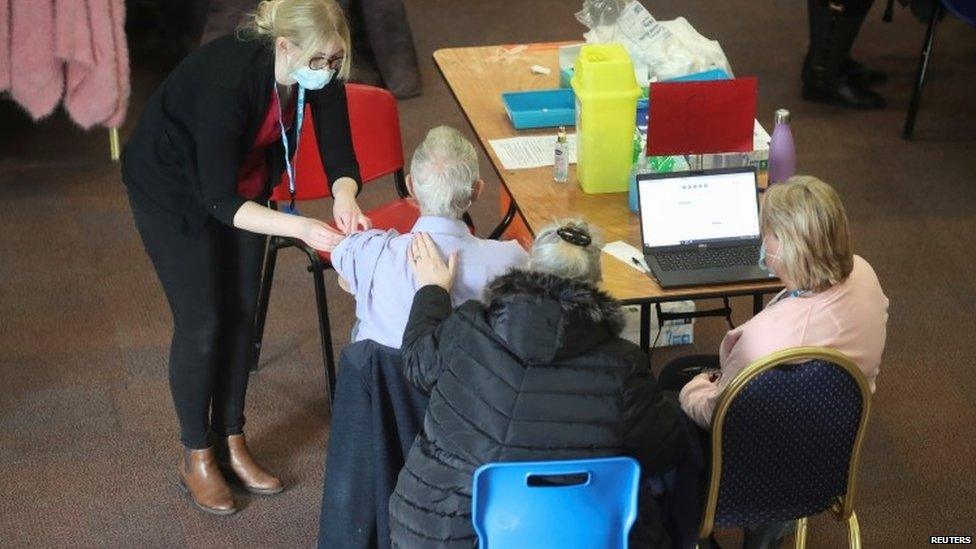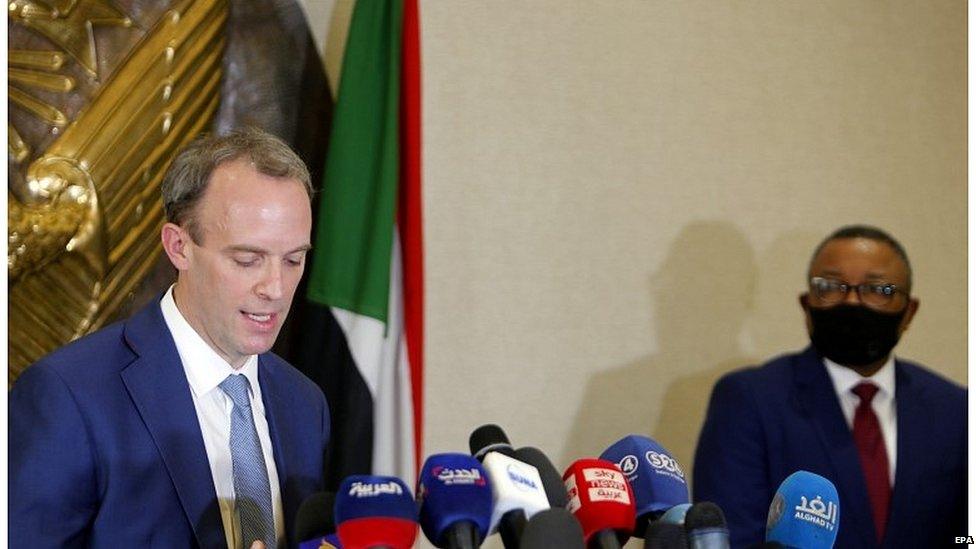The week ahead in Parliament: MPs scrutinise domestic abuse and environment bills
- Published

MPs want to a "road map" to begin lifting restrictions when vaccination targets are met
On one level, this looks like a pretty normal legislative week.
It will see MPs and peers beavering away at the detail of important measures like the Domestic Abuse Bill and the Environment Bill - but keep an eye on the debate about the next steps to deal with the pandemic.
Expect Conservative MPs from Covid Recovery Group to use the opportunity of any ministerial statement or Urgent Question (and there's bound to be at least one during the week) to push for a solid timetable for the lifting of restrictions once the top four high-risk groups have been vaccinated.
The government is aiming to achieve this by 15 February which, if it succeeds, will mean that the vaccines will be fully effective by 8 March.
If that deadline is met, the CRG insist that a "roadmap to the rollback of restrictions" should be in place.
One issue not due to come up this week, but where plots will be brewing, is the anti-genocide amendment to the Trade Bill.
This, remember, was passed in the Lords by the human rights campaigner Lord Alton, and struck down in the Commons.
His amendment allowed the High Court to issue a finding of genocide against a state, and that would have meant that any free trade deal with that country then lapsed.
The Bill now has to go back to the Lords, where peers will consider their response to its removal. The buzz is that they may well offer back to MPs a version of the compromise amendment floated by the former Conservative leader Iain Duncan Smith but not voted on.
The government only narrowly managed to remove the Alton amendment after a backbench Tory revolt cut its majority to just 11 votes, and some of the rebels thought a better rebel whipping operation could have saved it.
They may get another chance, with peers due to consider their response on 2 February.
Here's my rundown of the week ahead, with the usual health warning that it is based on the published agenda at the time of writing; government statements and Urgent Questions can be added on the day, at Mr Speaker's discretion, and the government has the power to change the agenda at minimal notice, if something urgent comes up.
Monday 25 January
The Commons opens (14.30) with Work and Pensions Questions, and this will normally be followed by one or two post-weekend Urgent Questions or ministerial statements.
That is followed by two Labour Opposition Day debates - the first on a motion attacking the government over council tax increases, and the second accusing the government of wanting to weaken employment rights.
On the Committee Corridor, Public Accounts (14:30) focuses on housing rough sleepers during the pandemic.
Treasury (15:30) has a session on economic crime, with evidence from Graeme Biggar, the Director-General of the National Economic Crime Centre at the National Crime Agency, and others.
In the Lords (12.00), there are questions on the Solar Winds cyber attack (the hacking of a cyber security company, believed to originate in Russia, which put the security of 18,000 government and private clients at risk).
Labour's Lord West of Spithead wants to know how many of the new ship orders for the Royal Navy, highlighted by the PM in his recent announcement about defence spending, have been ordered.
There are also questions about government plans to plant 30,000 hectares of trees per year and on rebuilding social capital.
There's also a Private Notice Question - the Lords equivalent of a Commons Urgent Question - on the role of the EU Ambassador to the UK, following the decision to withhold full diplomatic status - It comes from Lib Dem Peer and former Euro-MP Baroness Ludford.
Then peers embark on detailed scrutiny of the Domestic Abuse Bill, which aims to better protect and support victims and their children and to transform the response of the criminal, civil and family justice systems and that of local and national agencies.

MPs are pushing for a ban on non-fatal strangulation
This is the first of five days of committee stage consideration, where issues are probed and ministers explain the intent of the detail. While this discussion takes place around amendments, these are very rarely pushed to a vote at this stage.
The committee stage ends on 8 February, to be followed by two to three days of report stage, where actual votes will take place.
The process will be particularly important for this bill, because while it commands enthusiastic cross-party support, there are plenty of issues where peers and pressure groups beyond Parliament want to see changes and additions.
Labour, for example, have already signalled they want a number of improvements, like a change to the current legal presumption of contact for parents with their children, where there is evidence of domestic abuse.
The Lib Dems want child-on-parent abuse, and teen-on-teen abuse covered within by the Bill.
And while the bill was amended in the Commons to ban the so-called "rough sex" defence to murder, they also want a ban on non-fatal strangulation, which their spokesperson Lady Burt called "a shocking and horrific means of abuse, designed to terrify and achieve compliance in victims".
Tuesday 26 January
MPs open (11:30) with Treasury Questions.
Following that, former sports minister Helen Grant has a Ten Minute Rule Bill, calling for an independent football regulator for England to be established, with powers to license football clubs, distribute funds within football, review English Football League club finances, and reform the governance of the Football Association.
Then MPs will turn to the first day of detailed Report Stage consideration of the Environment Bill, where there will be a battery of interesting amendments.
Conservatives Chris Grayling and Desmond Swayne want to add the hedgehog to the list of protected animals under the Wildlife and Countryside Act while the SNP's David Linden has a proposal to reduce the impact on the environment of disposable nappies

MPs want greater protection in law for hedgehogs
Ex ministers Hilary Benn (Labour) and Oliver Heald (Conservative) have a sweeping amendment which would place a duty on the environment secretary to set and meet a target to begin to reverse the loss of biodiversity in England no later than 2030.
Labour's Ruth Jones and Alan Whitehead want to prevent the Oil and Gas Authority from licensing hydraulic fracturing, AKA fracking, and to revoke current licences
The Green Party's Caroline Lucas and Labour's Mohammed Yasin want to ban the use of chemical pesticides near buildings and spaces used by people, to improve air quality and protect human health. Conservative Chris Loder wants targets to cut plastic pollution.
Angling enthusiast Charles Walker, with strong cross-party support, wants annual reporting on the environmental impact of water abstraction on chalk streams.
And Conservatives Theresa Villiers and Bob Seeley have a series of amendments to bring in tougher environmental requirements for new housing developments.
It's a busy day on the Committee Corridor, where Health and Social Care and Science and Technology (11:00) continue their joint inquiry into the UK's response to coronavirus, with evidence from the NHS England chief executive Sir Simon Stevens.
On the agenda will be the progress of the vaccine roll-out, hospital capacity and infection rates, as well as the impact on other parts of the health service, such as cancer and mental health services.
Education (10:00) continues its inquiry into left-behind white pupils from disadvantaged backgrounds with a session focussing on early years provision and early intervention, with evidence from children's charities and policy experts.
International Development (14:30) has its first session with the new boss of the UK's aid budget, the Foreign, Commonwealth and Development Affairs Secretary Dominic Raab, whose department absorbed the Department for International Development, last year.

Dominic Raab will be questioned by MPs about the UK's aid strategy
Defence (14:30) has a follow-up session on armed forces' and veterans' mental health, with veterans minister Johnny Mercer and mental health minister Nadine Dorries
In the Lords (12:00), question time ranges across increasing house construction, pandemic restrictions on businesses and jobs in the night-time economy and legislation on TV license evasion.
Then peers turn to detailed committee stage scrutiny of the Counter-Terrorism and Sentencing Bill, which aims to ensure that dangerous terrorist offenders spend longer in prison, reflecting the seriousness of their offences.
Wednesday 27 January
Commons proceedings open (11:30) with half an hour of Scotland questions before Prime Minister's Question Time at noon.
The SNP's Owen Thompson presents a Ten Minute Rule Bill, which would require a minister to make a statement to Parliament if a contract is awarded under emergency statutory powers to a person in whom, or a company in which, a minister has a personal, political or financial interest.
Mr Thompson will be presenting the bill remotely - which I think may be the first time this particular parliamentary manoeuvre has been performed online.
The main legislative action is consideration of Lords amendments to the Covert Human Intelligence Sources (CHIS) Bill. This is the measure which gives police informants some legal protection if they commit illegal acts, where this may be necessary to preserve their cover or their credibility within criminal gangs.
Peers defeated the government over a number of issues, including limiting the use of child informants to "exceptional circumstances".
Labour has not opposed the bill but some of its MPs, like Stella Creasey, have pushed for changes.
There will also be consideration of Lords amendments to the much less contentious Medicines and Medical Devices Bill, although this was also significantly rewritten in the Lords, to curb the powers it gave to ministers.
The day's committee action includes Northern Ireland Affairs (09:30) looking at cross-border co-operation on policing, security and criminal justice after Brexit
Treasury (14:30) looks at the future of financial services with Lord Hill, a former UK European Commissioner and others, Home Affairs (16:00) has a session on online harms, in advance of the government's promised legislation, with witnesses from TikTok, Twitter, Google, Facebook and Whatsapp.
In the Lords (12:00) there's a question to mark Holocaust Memorial Day, from Lord Holmes of Richmond, about improving education in schools about the Holocaust
Following the latest wave of new peerages, peers continue to bombard ministers with questions about limiting the size of the House of Lords. The latest is from Labour's Lord Grocott, who has made repeated attempts to abolish the continued presence of hereditary peers in the Upper House.
Other questions include one from Lib Dem homelessness campaigner Baroness Grender on legislation to end "no fault" evictions.
Then peers resume their detailed scrutiny of the Domestic Abuse Bill with day two of committee stage consideration.
Thursday 28 January
MPs spring into action (09:30) with Transport Questions, followed by the weekly Business Statement and questions to the Leader of the House, Jacob Rees-Mogg.
The main debates are on subjects chosen by the Backbench Business Committee, starting with the annual debate on Holocaust Memorial Day. This will mark both the Nazi persecution during World War Tw and the subsequent genocides in Cambodia, Rwanda, Bosnia and Darfur - as well as present-day situations around the world.
This year's theme is "be the light in the darkness" - a call to action on different kinds of "darkness" - identity-based persecution, misinformation, denial of justice; and different ways of "being the light", for example, resistance, acts of solidarity, rescue and illuminating mistruths.
That is followed by a debate on the UN International Day of Education, which has the theme of "Recover and Revitalize Education for the Covid-19 generation".
It will see calls to step up collaboration and international solidarity to place education and lifelong learning at the centre of the recovery. Former International Development minister Harriett Baldwin leads.
On the Committee Corridor, Public Accounts (10:00) in advance of the COP 26 climate change summit, looks at the drive to achieve net zero carbon emissions, with evidence from the Permanent Secretary at the Department for Business, Energy and Industrial Strategy, Sarah Munby, and other officials.
The special Joint Committee of peers and MPs reviewing the workings of the Fixed-Term Parliaments Act (11:00) hears from two more constitutional savants; Lord Hennessy of Nympsfield and Professor Robert Hazell.
In the Lords (12:00) ministers field questions on the impact of the post-Brexit trade deal on musicians seeking to tour in the EU, the implementation of the UK-EU Joint Political Declaration on Asylum and Returns and implementing the recommendations of the Lord Speaker's Committee on the Size of the House.
The latter is the attempt to reduce the size of the House of Lords by encouraging more peers to retire than are created, an arrangement pretty much torpedoed by the government's decision to create a large number of new peers.
Unusually, there could be a contentious vote on the third reading of the Telecommunications Infrastructure (Leasehold Property) Bill, which, up to now has been fairly uncontentious.
A cross-party amendment from the independent peer Lord Alton of Liverpool, backed by Labour's Lord Adonis, and the Conservative Lord Forsyth opens up a new line of attack in Lord Alton's human rights campaigning, which saw an anti-genocide amendment attached to the Trade Bill; it seeks to prevent companies from using UK telecommunications infrastructure to facilitate human rights abuse, and to engage the transparency in supply chain provisions of the Modern Slavery Act.
That is followed by the Second Reading debate on the Financial Services Bill, which aims to improve the UK's regulatory system for financial services following the end of the Brexit transition period.
The Lords debates on the bill could see another attempt to bring in the new clause proposed in the Commons by Labour MP Stella Creasy. This would regulate buy-now-pay-later credit services, or perhaps the SNP amendment to impose a requirement on the Financial Conduct Authority to ensure financial services providers act with a "duty of care to act in the best interests of all consumers".
